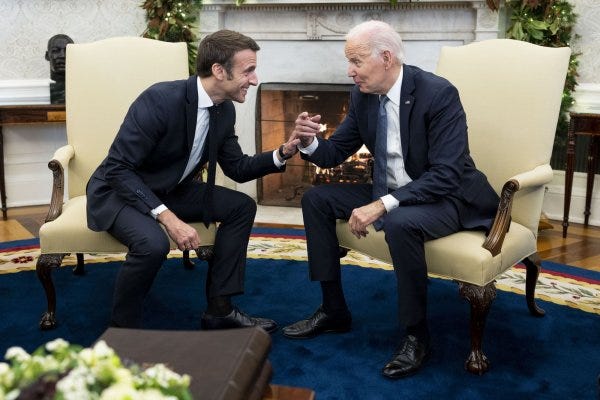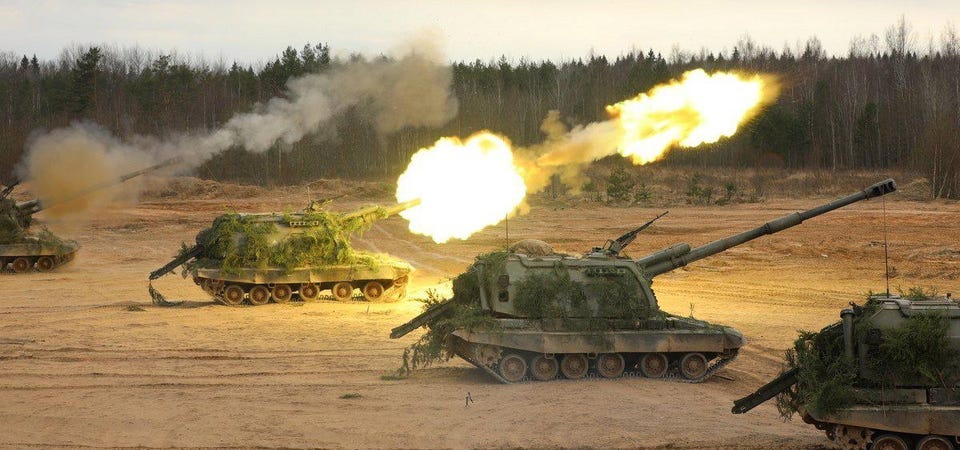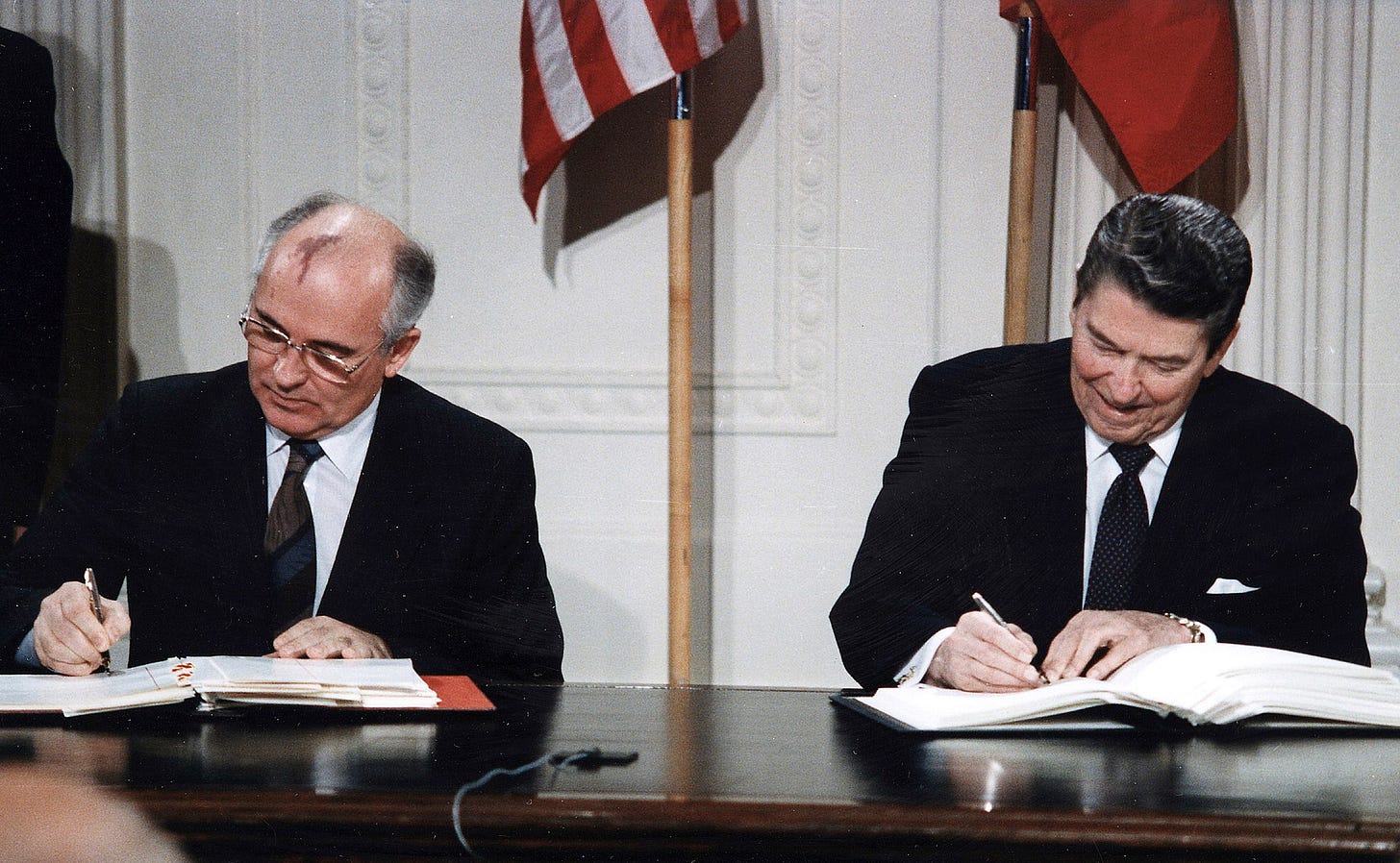Washington Tells Europe to Back Off on Any Ukraine Peace Deal
By Stephen Bryen
France's President Emanuel Macron visited Washington at the beginning of December and came home empty handed, in fact came home in worse shape than when he set out to convince Biden to negotiate with Vladimir Putin. Biden told him he was not going to negotiate with Putin until Russia pulled all its troops out of Ukraine. So much for diplomacy, something Macron and German Chancellor Scholz are trying to promote.
Washington is telling its major NATO partners, France and Germany, to back off from promoting any Ukraine peace deal.
Probably in connection with Macron’s visit to Washington (and certainly before he knew it was a failure), Scholz put in a fruitless call to Putin. He asked Putin to withdraw his troops from Ukraine "as soon as possible" but also urged a "diplomatic solution."
Scholtz and Putin spoke for an hour. Putin speaks good German, so a translator was not really needed. What was needed was an offer that might interest the Russian leader. No such offer was tendered.
Both European leaders are sitting on a European economic time bomb and could also face a security nightmare if the war in Ukraine spreads beyond Ukraine's borders. The Ukrainians, for their part, are doing their best to provoke the Russians. Firing missiles into a Polish village and blaming it on Russia, and exploding power plants inside Russian territory are a few examples that come to mind. On top of that, when speaking of the provocation business, we don't know who blew up the North Steam pipelines, but Ukrainian participation with US allies, most likely the UK, cannot be ruled out.
The following conclusions emerge:
Washington thinks Ukraine is winning the war against Russia, but that has not convinced the Pentagon that thinks the White House has overestimated Ukrainian victories in the field, and has not properly assessed the massive attacks on Ukraine's critical infrastructure that might soon cripple the country. So long as the White House and its NSC, mostly filled with amateurs, thinks they can win, there is no chance Biden will give an inch. That is the message Macron got as he flits around trying to work out some sort of deal.
Aside from the UK and Poland who both support the US position on Ukraine and want the war to continue until Russia is destroyed, the rest of Europe faces dire physical and economic conditions as winter proceeds and beyond.
Europe is also almost exhausted in ammunition. Macron says France will continue to supply weapons to Ukraine but not anything that would upset the Russians. Germany revealed that its war stocks are so low that should a general war in Europe start, Germany has only enough ammunition to fight for one or two days.
(Below: 2S19 howitzers from the Western Military District's 138th Motorized Rifle Brigade fire RUSSIAN DEFENSE MINISTRY PHOTO )
Russia has rejected all demands that it pull its troops out of Ukraine and won't agree to pull out troops as a condition for negotiations. This suits Zelensky and Biden, less so the French and Germans.
Just back from Washington, Macron talked about the need for security guarantees for Russia once the Ukraine war is over. In December, 2021 just before Russian forces deployed to Ukraine in February, Russia asked both Washington and NATO for two things: a settlement on Ukraine based on the Minsk II agreement, an agreement negotiated between Ukraine, the two breakaway "republics" (Luhansk and Donetsk), and backed by France and Germany along with supervision by the Organization for Security Cooperation in Europe (OSCE). Russia also asked for new security arrangements and guarantees in Europe, as Russian military leaders were warning the Kremlin that NATO was building up its forces in eastern Europe facing Russia, including (in their opinion) the introduction of nuclear weapons. In the Russian view, this was the flip side of the Russian buildup of SS-20 short range multi-warhead nuclear missiles facing western Europe, which led the Reagan administration to put Pershing II missiles in Europe (fighting off myriad European, particularly German, objections) to counter the Russian move. The outcome of this challenge was the Intermediate Nuclear Forces (INF) agreement that liquidated the local threat. Trump cancelled the INF, based on Washington's view of Russian cheating, and now in Russia's view, Washington is the aggressor party and seeking a nuclear advantage in the now-expanded eastern European territory (noting Poland and Romania as the main threats). The Russians also think that Washington's move into Ukraine which started around 2014, is part of an effort to not only NATO-ize Ukraine, but also to put US nuclear weapons near Moscow (essentially replacing the US Jupiter missiles in Turkey that were taken out as part of the deal reached in the 1962 Cuban Missile crisis).
[Below: Mikhail Gorbachev and Ronald Reagan sign the INF Treaty, 8 December, 1987]
While we may want to believe Russia's claims are simply nonsense, it does not matter a whole lot if this is what Russia's leaders think.
In the past, Ukraine was never of any particular strategic importance either to the United States or to NATO. Yet Washington has risked a great deal in the Ukraine venture that may soon backfire in various ways. Among them, political upheaval in Europe, an energy and economic crisis, shortages of armaments that undermines US security elsewhere, especially in Asia, and a danger that NATO may fracture irrevocably.
Unfortunately any prospect of a negotiated Ukraine settlement has passed history by. Now we must await what happens in the fighting and internally developments in Ukraine and Russia.




Excellent analysis Dr. Bryen.
Never underestimate Joe Biden’s ability to fuck things up. Now he’s going to war until the last Ukrainian is killed.